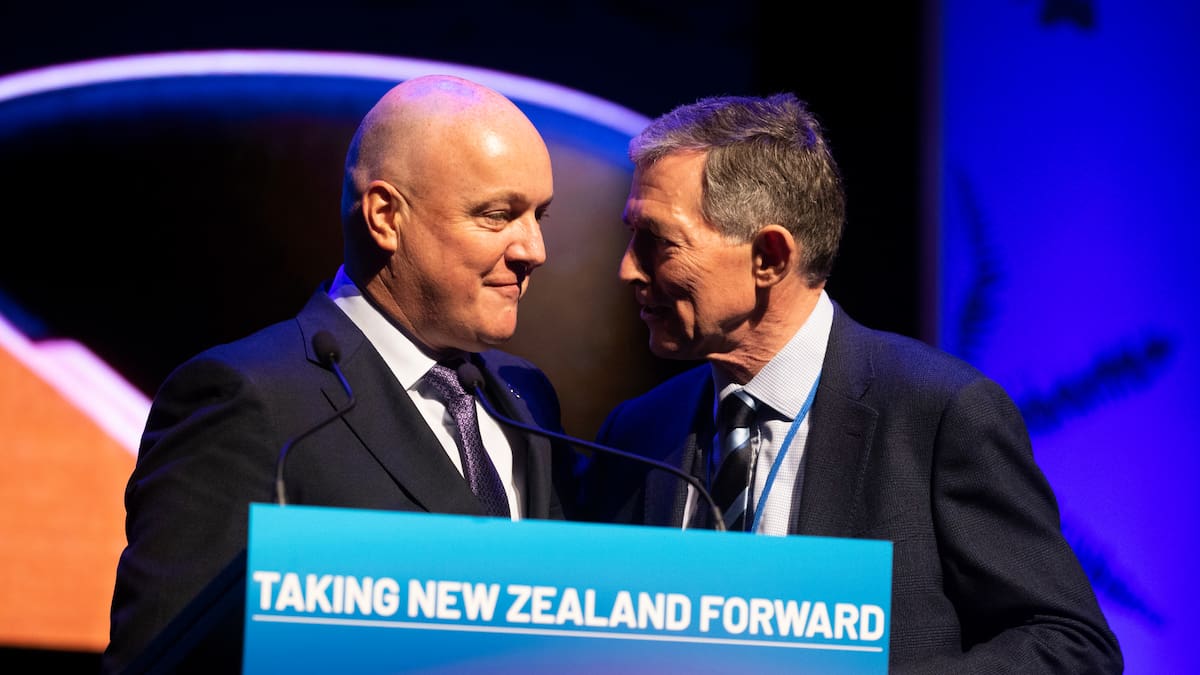“Desley, I love you very much,” Goodfellow said, his voice catching in his throat.
His final message to the party faithful was his best wishes in the “fight to win the party vote in 2026”.
Despite a party vote target in the mid-40s, National hadn’t registered above 40% since January last year and hadn’t breached 35% since April across several opinion pollsters. It received 38% in the 2023 election.
Speaking to the Herald on Sunday, Goodfellow praised National’s work while in Government but said the party’s chief threat to re-election was the economy.
“I think people have responded really well on education with Erica [Stanford], I think Simeon [Brown] is doing a fantastic job in health, but it’s the economy.
“If the economy suffers another shock then I think that the public can get tired of it and want change.
“I’m not seeing that at the moment, but there’s a potential for that to happen if there were another series of shocks or a trade war.”
Just hours before Goodfellow’s farewell, Prime Minister Christopher Luxon confirmed Trade Minister Todd McClay would shortly travel to the United States to discuss President Donald Trump’s announcement of 15% tariffs on New Zealand goods, an action Luxon described as “blunt”.

The news was an unwelcome development for the Government, given the potential for further pain for exporters, which would slow any economic recovery.
Recent polls affirmed the cost of living as the primary issue for voters, with the latest Ipsos Issues Monitor finding people trusted Labour more than National to lower prices.
Goodfellow acknowledged New Zealanders were “tired” of not seeing meaningful cost-of-living relief.
“My understanding is there’ll continue to be relief for that middle New Zealand, but it’s almost like they’re saying it’s not enough, it’s almost never going to be enough.”
A self-professed early adopter of the “survive til 25” slogan used in 2024, Goodfellow argued economic growth hadn’t been overestimated, but Trump’s approach to trade had eroded confidence.
“The issue is, how do you get a bit of momentum and that confidence again?”

Goodfellow stepped down as National president in 2022, but had previously voiced his original intention to resign in 2016.
“John Key and I did discuss at the beginning that we shouldn’t leave together,” he said.
“I just thought, ‘Well, I don’t want to do this role for a huge, long time’, but then we lost the election and then we had a period of some stability and coming into the 2020 election, the board wanted me to continue on as the president.
“Then we had a couple of leadership changes which just again meant they wanted that stability and continuity at the party and at the board level and I think that actually worked out pretty well.”
Amid a disastrous result in the 2020 election, Goodfellow faced pressure over the party’s candidate selection processes when the actions of several standing in 2020 hurt National’s chances.
He also endured a challenge for the party presidency from former Speaker of the House Sir David Carter, who in 2021 said he had “zero confidence” in Goodfellow’s ability to right the ship.
Goodfellow described that period as a “very unstable time for the party”.
“I never thought I would ever develop such a thick hide,” he said.
“There’s a lot of criticism in the world and in politics, but not all of it is justified.
“I knew I was supported by the board and the decisions that we were making and that’s why ultimately [Carter’s] challenge didn’t succeed.”
However, Goodfellow acknowledged changes to the party’s vetting proved some of the criticism was warranted.
“The vetting was very casual 20 years ago, maybe because people knew who the candidates were, but suddenly, more recently, we have people not known to the party coming in from the outside and we clearly did what we thought was good vetting, but there are some instances of behaviour that you can’t pick up, no matter how good you’re vetting.
“Many [candidates] are suitable … but they don’t necessarily understand what’s going to be involved and what’s going to be required.
“The challenge then is, are they telling you everything that’s going on and increasingly, we have to be more diligent to make sure that our members are respected by not having candidates put up in front of them that aren’t suitable.”
Asked to describe his lasting legacy with National, Goodfellow pointed to the various special interest groups within the party and his mission to make the party more inclusive.
Those groups included the party’s younger and older members’ wings, as well as collectives of members from Chinese, Indian, Filipino, rural, Māori and Pasifika communities.
“I know that there was no such inclusion before it, it was very much a traditional-looking party,” Goodfellow said.
“Within the party, it’s good for us to have groups that represent that culture, but also share the values and the philosophy of the National Party and want to be engaged in it.”
Adam Pearse is the Deputy Political Editor and part of the NZ Herald’s Press Gallery team based at Parliament in Wellington. He has worked for NZME since 2018, reporting for the Northern Advocate in Whangārei and the Herald in Auckland.





